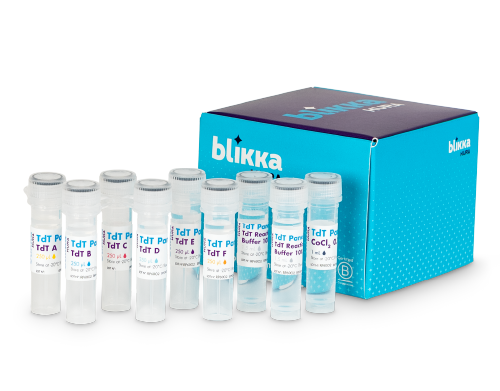Thermostability: Functions efficiently at different temperatures.

Accel TdT Program
CUSTOMIZED TDT ENZYMES
FOR DNA AND RNA SYNTHESIS
Start with our proprietary TdT Synthesis Panel and leverage Cantera™, our protein engineering platform, for tailored solutions.


Accel TdT Program
CUSTOMIZED TDT ENZYMES FOR DNA AND RNA SYNTHESIS
Start with our proprietary TdT Synthesis Panel and leverage Cantera™, our protein engineering platform, for tailored solutions.

What we offer
At Blikka Genomics, we are transforming the landscape of DNA and RNA synthesis. Our journey begins with the TdT Synthesis Panel, leading into the Accel-TdT Program where we customize TdT enzymes tailored to your specific DNA synthesis protocols using our advanced protein engineering platform, Cantera™.

What we offer
At Blikka Genomics, we are transforming the landscape of DNA and RNA synthesis. Our journey begins with the TdT Synthesis Panel, leading into the Accel-TdT Program where we customize TdT enzymes tailored to your specific DNA synthesis protocols using our advanced protein engineering platform, Cantera.
- Proprietary Portfolio of TdT Enzymes Ready for Evolution:
Commercially available TdT enzymes are not optimized for non-native nucleotide analogs needed for controlled synthesis of DNA/RNA sequences. Blikka Genomics offers a diverse portfolio of proprietary Terminal Deoxynucleotidyl Transferase (TdT) enzymes sourced from artificial chimeric origins. These sequences serve as a robust backbone that can be evolved and tailored to meet specific needs. - Protein Engineering Platform:
Our specialized protein engineering platform, Cantera™, leverages over 11 years of experience, employing a structured, data-driven process to generate and optimize enzyme candidates. By integrating deep sequencing for faster learning cycles, Cantera™ ensures efficient production and delivery of final enzyme products. - OEM Licensing and Custom Manufacturing:
Full access to our proprietary library of TdTs with OEM licensing agreements. Have enzymes manufactured at Blikka with custom labeling requirements or opt for manufacturing at your own facility, integrating advanced enzymatic solutions seamlessly into your production processes. - Sustainability Impact:
The Accel-TdT Program supports sustainable biotechnology by reducing harmful chemical waste and lowering energy consumption, compared to traditional chemical synthesis methods. This not only enhances your research but also contributes to a more sustainable future.
Technical Data Sheet![]() TdT Synthesis Panel TDS/Protocol
TdT Synthesis Panel TDS/Protocol
Brochure![]() TdT Synthesis Panel Brochure
TdT Synthesis Panel Brochure
- Proprietary Portfolio of TdT Enzymes Ready for Evolution:
Commercially available TdT enzymes are not optimized for non-native nucleotide analogs needed for controlled synthesis of DNA/RNA sequences. Blikka Genomics offers a diverse portfolio of proprietary Terminal Deoxynucleotidyl Transferase (TdT) enzymes sourced from artificial chimeric origins. These sequences serve as a robust backbone that can be evolved and tailored to meet specific needs. - Protein Engineering Platform:
Our specialized protein engineering platform, Cantera, leverages over 11 years of experience, employing a structured, data-driven process to generate and optimize enzyme candidates. By integrating deep sequencing for faster learning cycles, Cantera ensures efficient production and delivery of final enzyme products. - OEM Licensing and Custom Manufacturing:
Full access to our proprietary library of TdTs with OEM licensing agreements. Have enzymes manufactured at Blikka with custom labeling requirements or opt for manufacturing at your own facility, integrating advanced enzymatic solutions seamlessly into your production processes. - Sustainability Impact:
The Accel-TdT Program supports sustainable biotechnology by reducing harmful chemical waste and lowering energy consumption, compared to traditional chemical synthesis methods. This not only enhances your research but also contributes to a more sustainable future.
Technical Data Sheet![]() TdT Synthesis Panel TDS/Protocol
TdT Synthesis Panel TDS/Protocol
Brochure![]() TdT Synthesis Panel Brochure
TdT Synthesis Panel Brochure
HOW THE
ACCEL TDT
PROGRAM
WORKS
Step 1
Test a TdT
Begin by testing a TdT from our TdT Synthesis Panel. You can order the TdT as it is in custom-size formats, or evolve it.
Step 2
Data Gathering
We start by collecting comprehensive data from scientific literature, databases, experiments, and advanced bioinformatics tools to identify key residues for modification.
Step 3
Library Construction
We generate diverse variants in silico to be tested in the lab.
Step 4
High Throughput Screening
We produce and screen mutants in the lab to identify the best variants.
Step 5
Selection of Best Mutants
We conclude by conducting an in-depth characterization of top enzymes to evaluate performance metrics such as activity, stability, and kinetics.
HOW THE
ACCEL TDT
PROGRAM
WORKS

Step 1
Test a TdT
Begin by testing a TdT from our TdT Synthesis Panel. You can order the TdT as it is in custom-size formats, or evolve it.

Step 2
Gathering Data
We start by collecting comprehensive data from scientific literature, databases, experiments, and advanced bioinformatics tools to identify key residues for modification.

Step 3
Library Construction
We generate diverse variants in silico to be tested in the lab.

Step 4
High Throughput Screening
We produce and screen mutants in the lab to identify the best variants.

Step 5
Selection of Best Mutants
We conclude by conducting an in-depth characterization of top enzymes to evaluate performance metrics such as activity, stability, and kinetics.
THE STARTING POINT
TDT SYNTHESIS PANEL
Our versatile panel offers 6 proprietary and engineered Terminal Deoxynucleotidyl Transferase (TdT) enzymes, designed for high coupling efficiency with both natural and modified nucleotides, range of thermostability, and low bias.
These enzymes serve as a foundation to be tested, and the one that works best for customization in co-development with our Product Engineering team is selected.

Key Features
Compatibility with Blocked Nucleotides: Works effectively with 3’O-NH2 reversibly blocked dNTPs.
High Coupling Efficiency & Low Bias: Delivers excellent coupling efficiency and low bias with natural DNA nucleotides, modified DNA nucleotides, and natural RNA nucleotides, ensuring high-quality synthesis outcomes.
pH Resistance: Stable and functional across a broad pH range (pH 5-9), providing flexibility in various synthesis conditions.
THE STARTING POINT
TDT SYNTHESIS PANEL
Our versatile panel offers 6 proprietary and engineered Terminal Deoxynucleotidyl Transferase (TdT) enzymes, designed for high coupling efficiency with both natural and modified nucleotides, range of thermostability, and low bias.
These enzymes serve as a foundation to be tested, and the one that works best for customization in co-development with our Product Engineering team is selected.

Key Features
Thermostability: Functions efficiently at different temperatures.
Compatibility with Blocked Nucleotides: Works effectively with 3’O-NH2 reversibly blocked dNTPs.
High Coupling Efficiency & Low Bias: Delivers excellent coupling efficiency and low bias with natural DNA nucleotides, modified DNA nucleotides, and natural RNA nucleotides, ensuring high-quality synthesis outcomes.
pH Resistance: Stable and functional across a broad pH range (pH 5-9), providing flexibility in various synthesis conditions.
PERFORMANCE DATA
DIVERSITY IN TdT BACKGROUNDS +

6 TdT from different sources Tailored to precisely match your unique requirements, ensuring the best possible fit for you.
INCORPORATION OF DNA NATURAL NUCLEOTIDES +

Addition of natural deoxyribonucleotides. Enzymes were incubated with a 1:10 oligo:dNTP ratio for 1 minute at 37°C.
INCORPORATION OF DNA-MODIFIED NUCLEOTIDES +

Addition of modified nucleotides. Enzymes were incubated with a 1:10 oligo:dNTP ratio for 30 minutes at 37°C. Bovine TdT didn’t show activity.
INCORPORATION OF RNA NATURAL NUCLEOTIDES +

Addition of natural ribonucleotides. Enzymes were incubated with a 1:10 oligo:dNTP ratio for 30 minutes at 37°C.
FAQs
TdT
What is the TdT Synthesis Panel? +
The TdT Synthesis Panel is a curated set of six proprietary TdT enzymes engineered to efficiently incorporate both natural and modified nucleotides. These enzymes serve as a starting point for controlled DNA/RNA synthesis and are ideal for initial testing and evaluation.
What is the Accel TdT Program? +
The Accel TdT Program is Blikka Genomics’ custom evolution service to optimize TdT enzymes for specific DNA/RNA synthesis needs. Using our Cantera platform, we tailor TdTs for improved performance with modified nucleotides, unique reaction conditions, or integration into advanced workflows.
What is the difference between the TdT Synthesis Panel and the Accel TdT Program? +
The panel provides ready-to-use enzymes for preliminary experiments. The Accel TdT Program, on the other hand, enables the evolution and customization of those enzymes using Cantera™, our state-of-the-art protein engineering platform, to meet your specific synthesis needs.
What applications were the TdT enzymes in the Synthesis Panel and Accel TdT Program designed for? +
The enzymes in the TdT Synthesis Panel and those evolved through the Accel TdT Program were specifically designed for controlled enzymatic DNA and RNA synthesis, particularly incorporating non-natural nucleotides such as 3’O-NH₂ reversibly blocked dNTPs. These tools are ideally suited for synthetic biology, precision diagnostics, and next-generation sequencing workflows.
If you're considering TdT enzymes for other applications, we encourage you to contact our team. We’ll help determine whether it's best to start with the Synthesis Panel enzymes or to pursue a custom-evolved TdT through our Accel TdT Program, based on your specific goals and technical needs.
Does Blikka Genomics offer OEM licensing or custom manufacturing? +
Absolutely. We offer full access to our TdT enzyme library under OEM agreements. You can opt for in-house manufacturing at Blikka Genomics with custom labeling or tech transfer the process to your own facilities.
What is the recommended extension time for TdT reactions? +
Extension time varies by application. Typical reactions range from 1 to 30 minutes at 37°C, depending on oligo:dNTP ratio and desired product length.
What is the recommended input amount for TdT reactions? +
Start with 1–2 µM oligonucleotide initiator and a 10:1 dNTP ratio. These values can be adjusted based on your template and nucleotide incorporation goals.
What are the optimal storage conditions for TdT enzymes? +
TdT enzymes should be stored at –20°C. To preserve enzyme activity for extended periods, storage at -80°C is recommended.
Are the TdT enzymes compatible with blocked or modified nucleotides? +
Yes. Several enzymes from the TdT synthesis panel are optimized for efficient incorporation of 3’O-NH2 blocked dNTPs and other nucleotide analogs.
Do the enzymes require specific buffer conditions? +
The TdT synthesis panel is supplied with an optimized buffer. Most function across a broad pH range (5–9).
What thermostability ranges do the TdT enzymes offer? +
TdT synthesis panel enzymes are active between 38°C to 54°C, offering flexibility for integration into various synthesis workflows.
Ready to transform your synthesis process?
Take the first step towards customizing TdT enzymes for your DNA and RNA synthesis needs. Leverage our proprietary TdT Synthesis Panel and partner with our expert team through the Accel TdT Program to create tailored solutions that enhance your research.
Ready to Transform Your Synthesis Process?
Take the first step towards customizing TdT enzymes for your DNA and RNA synthesis needs. Leverage our proprietary TdT Synthesis Panel and partner with our expert team through the Accel TdT Program to create tailored solutions that enhance your research.